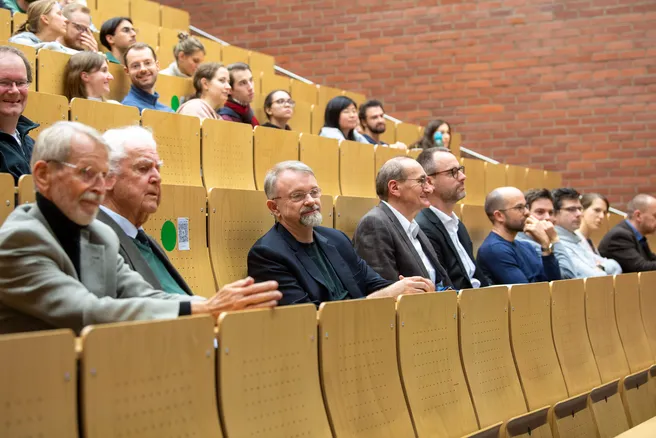The event, which began at 3:30 PM, was opened by the Dean of the TUM School of Natural Sciences, Prof. Johannes Barth, who warmly welcomed this year’s award recipient, Prof. Carolyn J. Anderson (University of Missouri, USA), and expressed gratitude to the Vice President for Research and Innovation, Prof. Gerhard Kramer, for his support.
Kramer thanked Dean Barth, Head of Department of Chemistry Prof. Tom Nilges, and TUM President Emeritus Prof. Wolfgang A. Herrmann, an initiator of this research professorship. He also expressed appreciation to the Jürgen Manchot Foundation for its commitment to supporting outstanding scientists, emphasizing the importance of the Professorship as a recognition of exceptional scientists in the field of chemistry. Kramer highlighted the historical significance of such figures as Adolf von Baeyer, the successor to Justus von Liebig, and stressed the influence of such figures on modern chemistry. Nilges then provided a detailed introduction to the Jürgen Manchot Foundation and expressed thanks to the Manchot family for their continued support. He presented past laureates and emphasized the significance of the Manchot Professorship for interdisciplinary and international collaboration in current research, and for outstanding contribution to teaching. He then handed the floor to Prof. Angela Casini (Chair of Medicinal and Bioinorganic Chemistry), who delivered an extensive laudatory speech for Anderson.
In her commendation speech, Casini praised Anderson’s interdisciplinary approach in inorganic and radiochemistry, which is particularly important to the TUM School of Natural Sciences and is reflected in the curriculum. Casini highlighted, “Prof. Anderson’s research throughout the past 30 years laid a foundation for the growth of radiometal-based agents for diagnostic imaging and targeted radionuclide therapy of cancer, a field now coined as ‘theranostics.’” Casini also emphasized Anderson’s dedication to making the significance of radiochemistry accessible to the public and concluded by stating, “I am convinced that Prof. Anderson’s unique expertise in inorganic chemistry, radiochemistry, and medical applications in cancer and other diseases, together with her contributions to the fundamentals and clinical practice of molecular imaging and education, will greatly complement the list of previous Manchot awardees, showcasing the breadth of inorganic chemistry and its interdisciplinary applications.”
Finally, TUM Vice President Kramer officially presented Anderson with the certificate for the 2023 Manchot Research Professorship. The laureate then gave her lecture entitled, “The Role of Inorganic Chemistry and Radiochemistry in the Theranostics Success Story.” She focused in particular on her research on copper complexes of isotopes Cu-64 and Cu-67, which play a significant role in cancer diagnosis and treatment. In her presentation, she shared her extensive research findings and scientific work in the field of theranostics. The event concluded with a Q&A session, followed by closing applause for Prof. Carolyn J. Anderson.
The TUM School of Natural Sciences extends its heartfelt congratulations to Prof. Anderson for this distinguished award.
Further Information and Links
- Prof. Carolyn J. Anderson, Simon-Ellebracht Professor in Medicinal Chemistry, Professor of Radiology at the University of Missouri, USA.
- Manchot Research Professorship: The Jürgen Manchot Foundation annually awards the Wilhelm Manchot Research Professorship to outstanding chemists. In addition to recognizing the recipient's scientific work, the foundation facilitates the recipient's teaching activities at the Chemistry Department of the Technical University of Munich (TUM). The award commemorates chemist Wilhelm Manchot (1869 – 1945), who served as professor and director of the Inorganic Chemistry Institute at the Technical University of Munich from 1914 to 1935. His contributions as an educator were also remarkable. He translated the well-known inorganic chemistry standard work, known to students as Hollemann-Wiberg, into German, a translation that remains in use to this day.
- Prof. Angela Casini, Chair of Medicinal and Bioinorganic Chemistry
Press Contact

